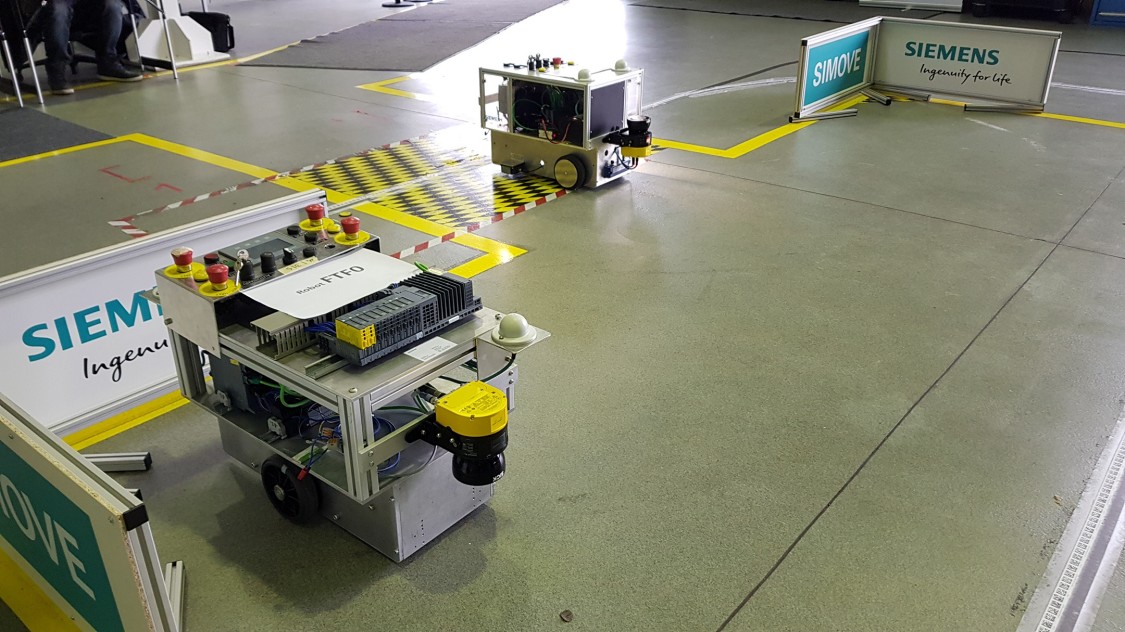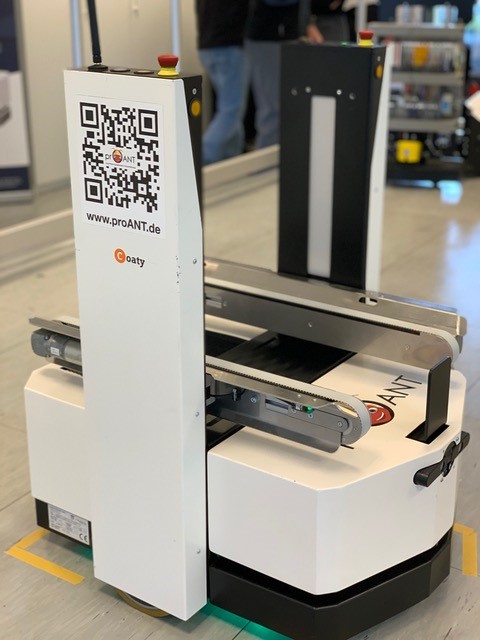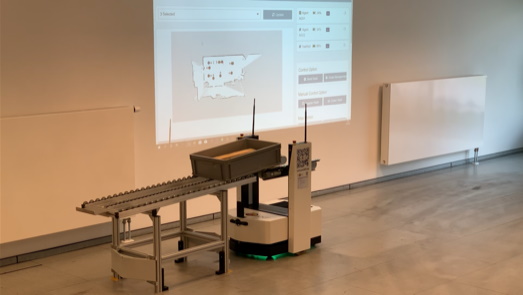FlowPro Transaction Network Connector released on GitHub
September 15, 2023The FlowPro Transaction Network Connector has been released on GitHub. It has been developed in our publicly funded research project FlowPro and serves as the basis for interaction within a self-organizing multi-agent based micrologistics system.
The Transaction Network Connector uses Coaty and Raft over Coaty as base communication and consensus technologies. It runs across platforms and is deployed as a set of platform-specific binaries, a Docker image, and a Node.js package.
Raft Consensus Algorithm over Coaty goes open source
August 21, 2023We are excited to announce the first open source release of a Raft Consensus Algorithm over Coaty implemented as a TypeScript/JavaScript library. Raft is a protocol with which a cluster of decentralized nodes can maintain a replicated state machine that is kept in sync through the use of a replicated log. The library uses the Coaty Framework for communication between nodes as well as for some aspects of persistency and cluster configuration.
The library is available as an npm package named @coaty/consensus.raft. Sources and documentation can be found on GitHub.
Coaty empowers Decentralized Decision Making in Duckietown
September 30, 2022Coaty was used to build a decentralized decision network in one of the courses of the Ferienakademie 2022 in Sarntal Valley, South Tyrol, Italy hosted by the Technical University München, FAU Erlangen, and University of Stuttgart and supported by Siemens AG. Coaty enables self-organizing allocation of different resources in a smart city simulated by the Duckietown platform. For more information check this link.
Video on the Collaborative IoT vision driving the development of Coaty online
April 26, 2022The Siemens “Industrial IoT Evolution” video is online. The video illustrates the Collaborative IoT vision driving the developments of Coaty over the last years.
Coaty Presentation at the Open Source @ Siemens Conference 2022
April 19, 2022We will present our success story on why and how we went open source with Coaty at the Open Source @ Siemens Conference 2022. Our presentation “Coaty - Publish OSS to drive Industrial Research and Innovation Projects” will be on 18th May 09:00 - 09:45.
Article: FlowPro - Roadmap to self-organizing logistics
February 2, 2022Together with our partner Flexus AG in the FlowPro project we published a blog article “FlowPro - Roadmap to self-organizing logistics” introducing the convergence of IT and OT technology for self-organizing logistics. The article (German only) is available here. Coaty is used in FlowPro as base communication technology to establish an AI empowered transaction network between the different heterogeneous logistic components.
Coaty featured on the official Siemens Open Source website
February 1, 2022Coaty is now also featured on the newly launched Open Source at Siemens website. It is one of the many Siemens contributions to the Open Source community loving to build great software.
Article: Presentation and publication 'Resource Allocation in Decentralized, Self-organized, Multi-agent Industrial Systems Using Deep Deterministic Policy Gradient' on IEEM 2021
December 14, 2021Our article Resource Allocation in Decentralized, Self-organized, Multi-agent Industrial Systems Using Deep Deterministic Policy Gradient which outlines some of the results of our research on reinforcement learning in the context of Coaty empowered systems for self-organizing logistics has been presented on the 2021 IEEE International Conference on Industrial Engineering and Engineering Management (IEEM).
pebbles successfully completed - Application of Coaty as core middleware for large-scale pilot
October 31, 2021Coaty has been successfully applied as core interaction framework in the real-world pilot of the pebbles project, which researched and demonstrated a platform for local energy trading (using a peer-to-peer model) integrating grid usefulness into the market mechanism in regional “energy-supply areas”.
Website of our partner project FlowPro online
June 1, 2021The website https://www.flow-pro.de of our partner project FlowPro is online. Coaty will be an integral part for the interaction of the different components of a hetereogenous micrologistics system.
Coaty for FlowPro Transaction Network
December 1, 2020Coaty will be the core framework for the interaction of the agents inside the self-organizing multi-agent system for micrologistics in the FlowPro project. It will realize the loose coupling and decentralized architecture for the heterogeneous agents representing ground and air-bound vehicles, logistics and communication infrastructure. In addition, it will integrate the building blocks for AI, task bidding, security, and external services needed to make the envisioned FlowPro scenarios possible. FlowPro is a research project publicly funded by the German Federal Ministry of Transport and Digital Infrastucture.
Coaty over libp2p
September 22, 2020A new binding package
@coaty/binding.libp2p
is available for Coaty JS. It provides a Coaty communication binding for
transmitting Coaty communication events over
libp2p, a brokerless peer-to-peer
network stack. Note that this binding is considered experimental for now.
This package comes with complete API documentation and the reference specification of the Coaty libp2p communication protocol.
Tinder for the Industrial IoT
July 21, 2020Siemens published a research story about bringing innovation to the automation of logistics applications with AGVs using Coaty.

Coaty supports WAMP, the Web Application Messaging Protocol
June 17, 2020A new binding package
@coaty/binding.wamp
is available for Coaty JS. It provides a Coaty communication binding for
transmitting Coaty communication events via the
WAMP publish-subscribe messaging
protocol.
This package comes with complete API documentation and the reference specification of the Coaty WAMP communication protocol.
Coaty 2.1 introduces communication bindings
May 29, 2020Coaty JS v2.1 introduces communication bindings, a mechanism to make Coaty’s underlying publish-subscribe messaging protocol interchangeable, while keeping the set of communication event patterns and your application code unaffected.
The default communication binding - MQTT with JSON-UTF8 payload encoding - is backward-compatible with Coaty 2 releases of Coaty JS and Coaty Swift. The communication binding API is considered experimental until Coaty 3.
Coaty 2 announced by heise Developer News
March 17, 2020The German heise Developer News Portal publishes a nice overview “Internet der Dinge: Coaty-Framework 2.0 gibt sich aufgeräumt”.
Coaty 2 released
March 16, 2020We are excited to announce a new major open source release of the Coaty framework, available in JavaScript/TypeScript and Swift.
Coaty 2 incorporates experience and feedback gathered with Coaty 1. It pursues the main goal to streamline and simplify the framework API, to get rid of unused and deprecated functionality, and to prepare for future extensions.
Among other changes, Coaty 2 features
- cleaned up Coaty object types,
- a simplified and more efficient distributed lifecycle management,
- redesigned Smart Routing by generalizing and broadening its scope,
- communication namespaces to restrict delivery of events,
- an optimized communication protocol.
Note that the essential set of communication event patterns didn’t change.
For the next minor release Coaty 2.1 we plan to introduce “communication bindings”, a mechanism to make Coaty’s underlying publish-subscribe messaging protocol interchangeable, while keeping the set of communication event patterns and your application code unaffected.
Coaty 2 applications are no longer backward-compatible and interoperable with Coaty 1 applications. The Coaty JS Migration Guide and the Coaty Swift Migration Guide describe (breaking) changes and how to upgrade your Coaty 1 applications to Coaty 2.
Coaty connects to OPC UA
January 10, 2020We have released a Coaty JS extension package that seamlessly connects decentralized Coaty applications with OPC UA servers. It provides specialized controllers to transform OPC UA data sources into Coaty Sensor Things, IO routing sources/actors, and raw MQTT messages, and to map Coaty remote operation calls to OPC UA method calls.
It comes with complete API documentation and an example project that demonstrates best practices and typical usage patterns.
Coaty JS template available
December 10, 2019We have integrated a ready-to-use template for a Coaty agent running in Node.js and programmed in TypeScript. Copy and use it as a blueprint for your own Coaty agent projects.
 Coaty goes Swift
Coaty goes Swift
October 22, 2019
Today we are excited to announce Coaty Swift, a Swift version of the Coaty framework targeted at native iOS, iPadOS, and macOS applications. Coaty Swift comes with everything you need to build awesome collaborative apps, including:
- a tutorial and best practice example projects,
- a developer guide,
- framework API documentation.
We hope you love it. ❤️ Give it a try and let us know what you think!
Our special thanks go to Sandra and Johannes, who did a great contribution in developing Coaty Swift.
Successful integration of InSystems proANT AGVs with Coaty
October 14, 2019Last week we demonstrated a decentralized fleet management application in the InSystems Lab in Berlin. InSystems proANT transport robots coordinate the execution of transport tasks in a self-organizing fashion based on the Coaty Framework without a central coordination system.


New Coaty JS development broker
May 8, 2019Coaty JS release [1.6.0] integrates a new MQTT broker for development and
testing. Due to concerns regarding performance and security vulnerabilities, the
Mosca broker used previously has been replaced by
Aedes, a lighweight
barebone broker that installs fast. This broker comes bundled with the Coaty JS
framework. When upgrading your Coaty JS applications, remove/uninstall mosca
dependency from package.json.
Coaty features remote operation calls
April 9, 2019Coaty JS release 1.5 introduces the Call-Return communication pattern. Unlike with classic RPC, this one-to-many, two-way pattern supports non-blocking remote operations to be executed by multiple Coaty agents. The calling agent can specify a context filter that defines conditions under which the operation is allowed to be performed.
Typical use cases of the Call-Return pattern include smart distribution of computational workloads to dedicated worker agents, and non safety critical, non latency sensitive decentralized command and control applications.
A new best-practice code example on remote operations can be found here.
Coaty announced by heise Developer News
February 18, 2019The German heise Developer News Portal publishes an overview article “Coaty: Open-Source-Framework für Collaborative IoT”.
Coaty as communication foundation for collaborative use case in CrESt
January 15, 2019Coaty builds the communication foundation for one of the core use cases of CreST, modelling collaborative operation autonomy of autonomous guided vehicles. The Collaborative Embedded Systems project (CrESt) is funded by the German Ministry of Education and Research under grant number 01IS16043.
Coaty goes open source
October 8, 2018We are excited to announce the first open source release of the Coaty framework, a cross-platform implementation targeted at JavaScript/TypeScript. It can be used to implement collaborative applications running as mobile or web apps in the browser or as Node.js services. Coaty JavaScript is available as an npm package named coaty. Sources and documentation can be found here.